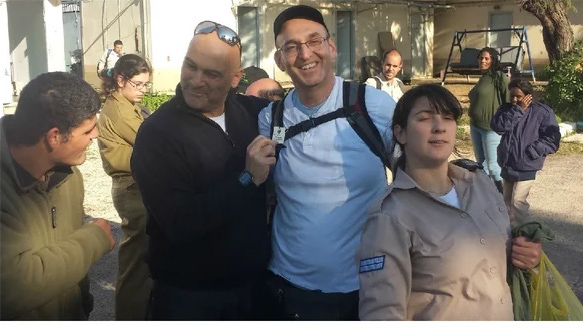
Colonel Richard Kemp, a retired British army officer, famously said that Israel has the most moral army in the world. He based his opinion on the measures taken by the Israel Defense Forces to minimize wartime civilian casualties. But the IDF’s unique attention to at-risk civilians isn’t limited to warning Gazan citizens about incoming attacks.
The IDF goes above and beyond when it comes to supporting soldiers with physical, developmental and intellectual disabilities who enlist or are injured on duty. Israel’s Special in Uniform(SIU) program, in partnership with the Jewish National Fund, offers young Israelis with intellectual and developmental disabilities the skills and training necessary to thrive in the IDF, live independently, and integrate into Israeli society. The program is designed to plant the seeds for a more inclusive and compassionate army, society, and nation. Lieutenant Colonel Tiran Attia, who heads the program, says that his vision for the soldiers with disabilities is 100 percent integration into society.
Currently, there are 256 people in SIU, but according to Attia, they hope to have 1,000 initiates into the army by 2020. It is an expensive program, Attia acknowledges, but Israel, the Israeli Army and the Jewish people are all part of the system that must make a better community and society. He explains, “the Israeli army is a huge chain and we are obliged and committed to take care of the units of those chains which are not strong like the others. The army is a melting pot for all the people of Israel. We are one.”
In Israel, citizens are typically required to serve in the Israeli army. Israelis with disabilities are exempt from the army but are able to volunteer in the IDF, either part time or full time. For them, the ability to enlist in the IDF means taking part in the most normalizing experience of Israeli maturation. Not only is the army a period of self-growth for individuals, but it also opens doors for jobs, educational opportunities, and social life in Israel. Thus, for people with disabilities who may not otherwise be able to integrate into the population, enlisting in the army is key.
For soldiers who are physically injured during service, the IDF offers an enormous amount of support, both financial and non-monetary, even if the injury is unrelated to service. Sivan Levy, a women’s Paralympic Goalball athlete, who is representing Israel in the Rio Olympics, suddenly stopped seeing well during her service as a medic. The IDF permitted Sivan to end her service half a year early, but continued to allow the tests, medicines, and treatment required to treat her condition. “The IDF helps me with anything that I need medically. The doctors help with the things that I need for my eyes, not only procedures and medicine, but glasses as well. Basically everything in my life they help with- anything that blind people need, whether it’s with my studies, such as someone to read for me, tutors, and financial assistance towards studying. They give me a better way of living.”
When asked why she thinks the IDF continues to help her, Sivan answered, “The IDF doesn’t have to do this, but they were kind to me and decided to take care of me even though there is no proof that my loss of sight had any connection to something that happened in the army. The IDF is really helpful for me and they do whatever they can to help me.” Sivan says that now that she has finished education, she would not mind enlisting in the army again.
Attia confirmed Sivan’s experiences as consistent with what he has seen with Special in Uniform: “We see the full support of the commanders and soldiers. Some people, out of ignorance, see the soldiers with disabilities as a burden. But this is our work – to show them that they are a part and they are contributing.”
Combating ignorance is precisely one of the main goals of the Special in Uniform program, in addition to promoting the inclusivity of Israeli society, changing the way Israelis view those with special needs, and transforming the social face of Israel. According to Sivan and Attia, thanks to the IDF, this goal and dream may soon become a reality.
Eliana Rudee is a fellow with the Haym Salomon Center and the author of the “Israel Girl” column for JNS.org. Her bylines have been featured in USA Today, Forbes, and The Hill. Follow her column on JNS.org.